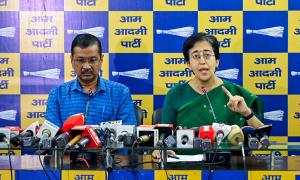The Supreme Court has upheld the disqualification of a member of a municipal corporation in Haryana for violating the two-child norm.
The court said the two-child norm "is in national interest to check the growth of population by casting disincentives even through legislation."
The SC order comes when the Union government has made it known that it is not in favour of imposing the two-child norm on anyone.
Upholding disqualification of Zile Singh as municipality member under the Haryana Municipal (Second Amendment) Act, 1994, a Bench comprising Chief Justice R C Lahoti, Justice G P Mathur and Justice P K Balasubramanyan reiterated the court's 2003 judgment upholding the validity of the law imposing the two-child norm on members of panchayats and municipalities.
The Bench said in the case 'Javed and Others vs State of Haryana', the "court has been at pains to point out how the growth of population of India is alarming."
Justice Lahoti said the right to contest an election is neither a fundamental nor a common law right as it is a right conferred by the statute. "The statute which confers the right to contest an election can also provide for the necessary qualifications and disqualifications for holding an elective office," he said.
Inaugurating the 'First All India Workshop of Health Secretaries' in New Delhi earlier in the day, Union Health Minister Anbumani Ramadoss presented a diagonally opposite view on the issue.
He said the 'two-child norm' cannot be imposed on anyone as it will be a "violation of fundamental rights."
"Population stabilisation programme will be pursued wholly on voluntary basis," he said and added that goals to this effect "will be achieved without coercive measures being incorporated into National Population Policy."








More from rediff